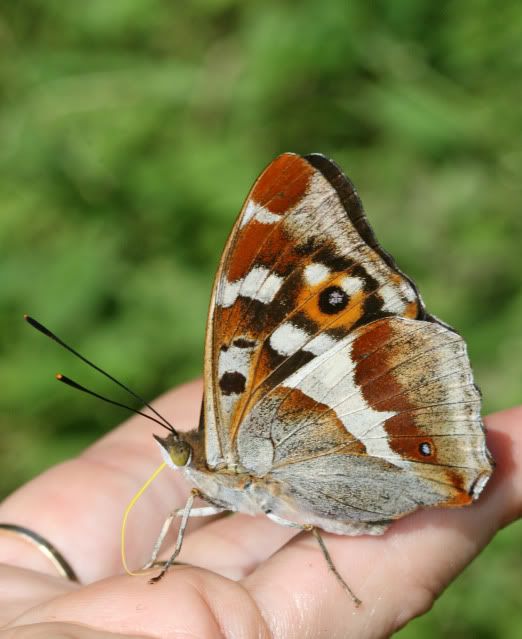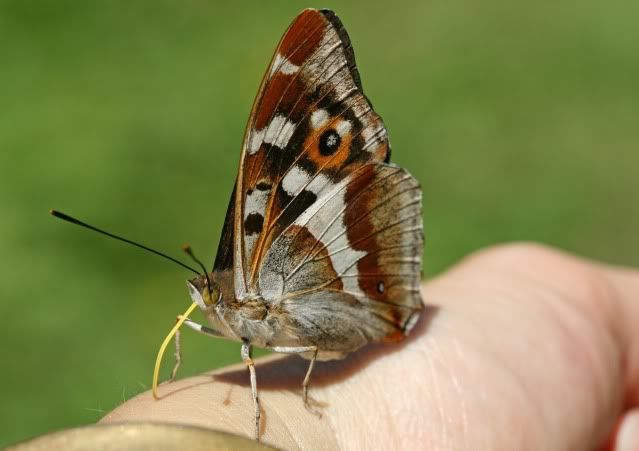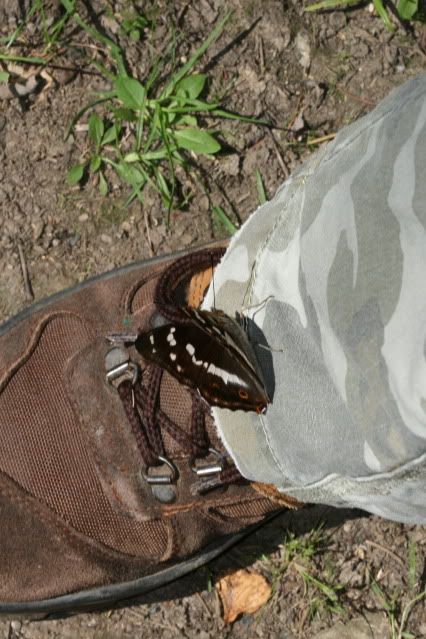Page 14 of 14
Re: June 2009 Sightings
Posted: Mon Jun 29, 2009 5:49 pm
by sahikmet
At the weekend Large skippers , Comma and Marbled white at Mill Hill. Adrian Riley's new book, British and Irish Butterflies full of information worth every penny I paid. Amazon through one of there Book sellers, Brown Books had a copy at £4.58 plus £2.75 postage, took a chance, was delivered on the third day of order.
Cheers
Sezar

Re: June 2009 Sightings
Posted: Mon Jun 29, 2009 6:07 pm
by NickB
Great set of shots Neil!
Waiting to get that elusive Purple Hairstreak myself (probably a long time

)

N
Re: June 2009 Sightings
Posted: Mon Jun 29, 2009 6:31 pm
by xmilehigh
Great shots everyone, especially the PE, really looking forward to seeing them.
SWF from Clanger Wood today.

Re: June 2009 Sightings
Posted: Mon Jun 29, 2009 7:18 pm
by Shirley Roulston
Superb Jerry.
Shirley
Re: June 2009 Sightings
Posted: Mon Jun 29, 2009 7:26 pm
by Susie
I decided to go over to my local woods today where I am convinced there are likely to be Puple Emperors but failed to see any. I did see half a dozen purple hairstreaks, a dozen or so commas, large skippers, large and small whites, loads of meadow browns and a couple of painted ladies. Also a pair of grey wagtails and their brood.
Re: June 2009 Sightings
Posted: Mon Jun 29, 2009 8:06 pm
by Ian Pratt
Walter's Copse Newtown was buzzing this evening after work with 10 species: red admiral, white admiral, swf, comma, large white, painted lady, small and large skipper,marbled white and gatekeeper (first of the year). Also good broad-bodied chaser which posed for photos.Returned home to find small white and small tortoiseshell in fields near home.

Re: June 2009 Sightings
Posted: Mon Jun 29, 2009 8:18 pm
by Perseus
Hello,
29 June 2009
I suspected that the small brown butterflies blown about in the breeze of
the last few days were
Gatekeepers, but a female settled for confirmation
for the first definite of the year. On the Adur Levels,
Narrow-bordered
Five-spot Burnet Moths,
Zygaena lonicerae, visited Tufted Vetch, for the
first record in 2009. Eight butterfly species were recorded near Shoreham
in the late afternoon, including a
Marbled White and
Small Tortoiseshell
over Frampton's Field, Old Shoreham. And a
Red Admiral nearby.

First Adur Butterfly Dates 2003 to 2009
http://www.glaucus.org.uk/ButterfliesFFT.htm
Adur Butterfly & Large Moth List
http://www.glaucus.org.uk/Butterfly-list2009.html
Cheers
Andy Horton
glaucus@hotmail.com
Adur Valley Nature Notes
http://www.glaucus.org.uk/Adur2009.html
http://www.glaucus.org.uk/Adur2008.html
Adur Valley Nature Notes: June 2009
http://www.glaucus.org.uk/June2009.html
Re: June 2009 Sightings
Posted: Mon Jun 29, 2009 10:15 pm
by Dave McCormick
Good day today, exception being the number of horse fly bites I got trying to get photos. Saw in Mountstewart where I live:
30+ Meadow Brown
20+ Ringlets
1 Red Admiral
1 Small Tortoiseshell
1 Painted lady and a few caterpillars
hundreds of peacock caterpillars (I think, see photo below)
Ringlet (Not hard to follow like meadow browns, but they rest in places they can't be easily photographed)

Meadow Brown (I got bitten 6 times by flies just to get this shot)

Caterpillars (Are these Peacock?) First a closeup of a few

Loads in nettles

Painted Lady caterpillar:

Like the Gatekeeper photos Ian, thats one I have never seen before, does not occur in Northern Ireland, only in Southern Ireland here.
Re: June 2009 Sightings
Posted: Tue Jun 30, 2009 6:14 am
by Jack Harrison
Good moth catch last night including this Swallow-tailed Moth.
Now to the more “serious” stuff – off to Fermyn Woods.
Jack
Re: June 2009 Sightings
Posted: Tue Jun 30, 2009 10:27 am
by Piers
Pete Eeles wrote:NickB wrote:Went to Buxton Heath Norfolk this morning for SSB. Thanks to Angie for directions

; exactly where you said they would be...and they were reasonably well-behaved since it remained overcast most of the time. (Didn't make taking pictures any easier - had to use higher ISO's and lower f-stops to achieve an acceptable speed). Cute little things!
...good work by everyone this month in this thread

N
Nice shots Nick. I've seen loads of SSB photos where the female has an unusual amount of blue on the forewings. I've been taking note of this phenomenon since Colin Baker sent me some photos from Cornwall several years ago where the female has massive amounts of blue on it - and yet this colony isn't regnognised in any literature that I've read. I've come to the conclusion that the subspecies distribution isn't as clear cut as some would suggest - it would be great if someone could do a study into this!
Cheers,
- Pete
Hi Pete,
IMHO the split of uk Silver Studded Blue into four distinct subspecies is a little optimistic. The traits that are used to identify certain 'subspecies' (for example blue females) are present in almost all colonies to a greater or lesser degree. SSB females are very variable across the UK range, and colonies (for example) on the Cornish dune systems can throw out a remarkable range of variation; from females with greatly enlarged orange lunules on the upper side, to those with none at all, as well as those that are uniformly brown, to those that are almost all blue. This is true across the majority of colonies in Britain.
The butterfly is adaptable too when it comes to the available food plant. In Cornwall (again as an example) there are colonies which use Birds Foot Trefoil as a larval food (such as the dunes colonies) as well as colonies in the abandoned tin mining areas that use exclusively heather. In captivity, however, females from these colonies will happily lay upon which ever food plant is available from the range of plants that the larvae will consume, demonstrating that the butterfly is simply adapting to whichever food plant is available in the area of the colony.
The labelling of the Portland colonies as a separate subspecies is bordering preposterous. Cretaceous (if it could ever be considered to be a subspecies) inhabited the downland of Kent and Essex etc, quite why the Portland colony should be attributed with this moniker is without substantiation. These colonies again throw out a wide range of variation in both sexes and the fact that they are breeding on the chalk is surely not enough to warrant a subspecific split; there is quite simply not enough distinct differences to separate the Portland colonies from those anywhere else. Plenty of other species exhibit considerable variation across their range and breed in geologically diverse areas and yet these species are not (quite rightly) split into subspecies.
Some people have cited the double brooded Cornish colonies as a reason to award these colonies separate subspecific status, however they are merely responding to the local climate. A second subspecies of SSB can be reared in captivity from any SSB colony in the country (with the possible exception of ssp caernensis) therefore this too surely must rule out grounds for a split.
Argus and caernensis are surely the only two subspecies of the Silver Studded Blue in Britain, distinguished by their distinct size differences and flight periods.
It's certainly an interesting topic, and I am convinced that the usual splits are simply regurgitated in each new book/resource with the same list of vague differentiating characteristics without any research being carried out into whether these splits have any real foundation. The species is simply far too variable for criteria such as greater size and brighter blue in the male (for example) to be grounds for recognition as a distinct subspecies.
All the best for now...
Re: June 2009 Sightings
Posted: Tue Jun 30, 2009 12:39 pm
by Eris
jackharr wrote:Good moth catch last night including this Swallow-tailed Moth.
Now to the more “serious” stuff – off to Fermyn Woods.
Jack
Ah so
thats what it is, I had 4 of these hanging around our porch light two days ago. Thanks. - what is their foodplant?
Re: June 2009 Sightings
Posted: Tue Jun 30, 2009 2:15 pm
by Susie
The PEs today at Southwater were very friendly!
This one decided to crawl from its feast (of dog poo - ewww) onto my finger. It then had a good old feed on my hand (I knew having sweaty hands would come in useful one day!) and then climbed up on to my wrist. It didn't like the taste of my bangles and flew off when it reached them.



Later on another one landed on my trousers.
Also at Southwater, white admiral, silver washed fritillary, purple hairstreak, comma, large white, skippers, meadow brown, marbled white and a painted lady laying eggs on thistles.

Also, I met a man who had made a wonderful find today, but more of that later.

Re: June 2009 Sightings
Posted: Tue Jun 30, 2009 2:26 pm
by sahikmet
Park Wood lots of Small skippers, one large, no sighns of White admirals today. A number of Ringlets.
Cheers
Sezar
Re: June 2009 Sightings
Posted: Tue Jun 30, 2009 3:09 pm
by Jack Harrison
I wrote earlier:
Now to the more “serious” stuff – off to Fermyn Woods.
...and it was brilliant. At least a dozen Emperors and twice that number of White Admirals and Commas. One PE had a liking for Phil Bromley’s trousers. It ignored mine but maybe that says something about Phil’s trousers.
Jack
Re: June 2009 Sightings
Posted: Tue Jun 30, 2009 3:29 pm
by eccles
Waiting for the females was this alert and impatient male SWF at Clanger Wood yesterday. He was in for a long wait as I didn't see a single female, although there were plenty of fresh looking males. Also seen were one or two WA, SS, LS, MW, and several brown hawkers patrolling the main footpath.
Re: June 2009 Sightings
Posted: Tue Jun 30, 2009 7:02 pm
by fourwings
Fermyn woods was excellent today, a great show of Butterflies. I lost count of the number of Purple Emperors that I saw over the 6 hours I was there, they were still coming to the ground at 3 o'clock this afternoon.
Also seen were excellent numbers of White Admiral including a single of the aberrant form obliterae, many fresh Commas, Red Admiral, Painted Lady, Small Tortoiseshell, Speckled wood, large White, Small White, Green-veined White, Silver-washed Fritillary and White-letter Hairstreak, an excellent if not very hot day

Re: June 2009 Sightings
Posted: Tue Jun 30, 2009 7:43 pm
by Trev Sawyer
I can't claim to have spotted this one myself (it was reported on the Herts BC website), but there was an surprising/interesting butterfly sighting on a live tennis match at Wimbledon the other day... If you can view the BBCi player, scroll through to 8 minutes 55 seconds of the match involving Venus Williams last Thursday and look for the butterfly acting as a baseline judge

Hope it flew off before it was hit by one of Venus' serves!!!
See:
http://www.bbc.co.uk/iplayer/events/wimbledon/p003kbkh
Trev
Re: June 2009 Sightings
Posted: Tue Jun 30, 2009 8:11 pm
by Jack Harrison
Unfortunately I didn’t notice when I took this photo on 30th June at Fermyn
but this seems to be an aberration with less extensive dark markings on the wings. So in my ignorance, I didn’t at the time have any reason to follow the butterfly for a better full wing shot. Main ride (opp gliding club) about 600 metres along track.
Jack
Re: June 2009 Sightings
Posted: Tue Jun 30, 2009 9:36 pm
by NickB
Felix wrote:Pete Eeles wrote:NickB wrote:Went to Buxton Heath Norfolk this morning for SSB. N
I've come to the conclusion that the subspecies distribution isn't as clear cut as some would suggest - it would be great if someone could do a study into this!
- Pete
Hi Pete,
IMHO the split of uk Silver Studded Blue into four distinct subspecies is a little optimistic. ....
Argus and caernensis are surely the only two subspecies of the Silver Studded Blue in Britain, distinguished by their distinct size differences and flight periods.
It's certainly an interesting topic, and I am convinced that the usual splits are simply regurgitated in each new book/resource with the same list of vague differentiating characteristics without any research being carried out into whether these splits have any real foundation. The species is simply far too variable for criteria such as greater size and brighter blue in the male (for example) to be grounds for recognition as a distinct subspecies.
All the best for now...
Reading in the literature, and having seen them in Buxton and the pictures posted here, with your excellent commentary, I tend to agree.
Argus (whoops - edit) appears distinctly like the Common Blue - both with the extreme variations in female forms and the relatively uniform appearance of the males - slight variations in colour but mainly in size. The CB can also be found across a similar range of habitats to the SSB; we certainly don't have large numbers of CB sub-species - rather a large number of aberrations (cf Cockayne) or variations that occur in response to local conditions.
Interesting stuff though - I love the females with the bright blue and orange hind wings, really beautiful

N
Re: June 2009 Sightings
Posted: Wed Jul 01, 2009 10:15 pm
by Neil Hulme
Hi all,
Here are a few pics taken in the later part of June. The Purple Emperors are shots that accompany stories at
http://apaturairis.blogspot.com/ (Purple Empire Blog). The High Brown Fritillary will shortly appear with a story on the BirdGuides webzine at
http://www.birdguides.com/webzine/default.asp
Neil










